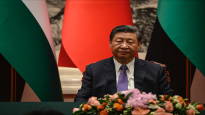In China, there is no longer even a clear procedure in case the party leader Xi, who has concentrated power for himself, suddenly has to leave his position.
BEIJING June 15, 2023 will be remembered as one of the hottest days in history in the Chinese capital. The thermometers dipped to 40 degrees in the afternoon, which is a suffocating atmosphere in a metropolis of 20 million inhabitants.
No wonder citizens couldn’t bear to go to the streets leading to Tiananmen Square to wait if they could see Xi Jingping motorcade.
The president and party leader, who turns 70 today, was hardly upset about it. He was working normally, so the motorcade also moved with signs of work.
After the corona break, foreign dignitaries are visiting Beijing again. This week, Xi has hosted, among others, the president of the Palestinians Mahmoud Abbas. At the end of the week, the US Secretary of State will arrive in town Antony Blinken.
The 70-year-old Xi has rarely been seen among ordinary people in recent years. He is more and more reminiscent of a distant autocrat. Even in spite of the fact that in the early days of his political career he specifically fought against the monopoly power.
The party does not accept lifetime positions
Xi’s predecessors and other Communist Party influencers sought to prevent Mao Zedong’s the revival of a similar personality cult in China. Mao founded the People’s Republic of China in 1949 and led it until his death in 1976.
The Communist Party has since written into its rules that it no longer accepts lifetime positions and none of its members enjoy immunity if they perform their duties poorly.
The leadership positions in the party should be temporary, no more than ten years. Even in lower positions, according to the party’s methods of operation, one should not hold more than 15 years at a time.
However, these rules do not seem to apply to the current leader of the party. Xi, who came to power in 2012, elected himself last October for his third five-year term as party secretary general.
Limits on the number of presidential terms were removed in 2018. This means that Xi can be president until his death.
The challengers have no business with the Politburo
In China, the party leader is a more important decision-maker than the president. Xi has made a calculated move to get to that position and keep it for himself.
After being elected to a second five-year term as Party General Secretary in 2017, he broke Chinese political etiquette. He did not invite his potential followers to his close circle.
Etiquette would have required that Xi would have appointed new talents to the Politburo Standing Committee, the decision-making body of the party, who could, with experience, advance all the way to the top of power.
However, Xi chose officials characterized as loyal workers, none of whom are his challengers as the leader of the country of more than 1.4 billion people.
As old as Biden?
The fact that there is no public discussion about the length of his term of office and a possible successor is indicative of Xi’s great power and the way he uses it. The rumor mill may be spinning, but possible names have not been brought up more widely.
The Wall Street Journal reports citing party sources that Xi may want to stay in office at least until 2035. He would be 82 years old at the time, i.e. the same age as the President of the United States Joe Biden is in next year’s election, where he will seek a second term.
The centralization of power worries many, and not only in China. If the leader of a superpower falls seriously ill or has to suddenly leave his position for some other reason, the consequences could be unpredictable.
The vice president would temporarily take over the duties of the president and the central committee would choose a new leader for the party. However, experts warn that in the absence of clear successor candidates, the situation could turn into an unpredictable power struggle.
Listen here to the News podcast, where ‘s new Asia correspondent Mika Hentunen talks about China and also a little about his beginnings.
